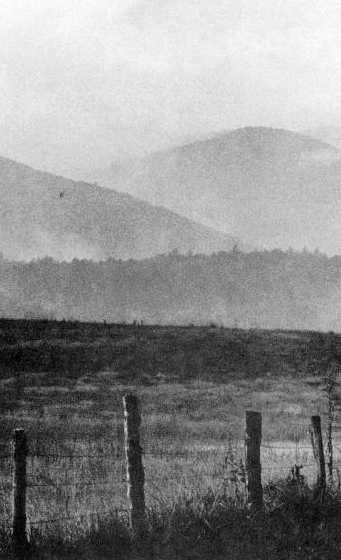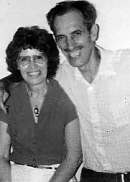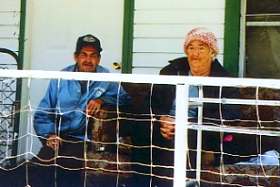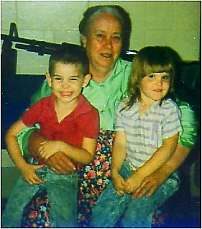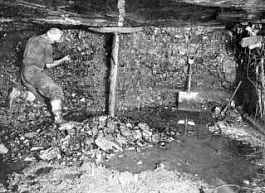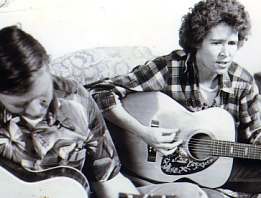I
Can Almost See the Lights of Home ~
The Transcript Charles Hardy III & Alessandro Portelli
The script of the aural essay "I Can Almost See the Lights of Home" begins below and is included here for reference. We have divided the script into four sections for faster browser loading. It is best not to read along while listening.
Dee Dee Napier:
Music: "I Can Almost See the Lights of Home" HOST INTRODUCTION In June, 1983, University of Rome professor Alessandro Portelli traveled to Harlan County, Kentucky, in search of the class struggle in the United States. A literary scholar and political activist, Portelli has returned almost every year since to conduct oral history interviews that explore the shared memories and culture of some folks who live in an isolated corner of the southern Appalachians. In October 1996, Portelli returned to Harlan to tape a new set of interviews with a portable DAT recorder and stereo microphone. What emerged from these three days of recording were a series of connections: connections between the residents of Harlan County and people in Third World nations, not only in their poverty and exploitation by outside business interests, but in their complex relationship to nature and the importance they place on family and place; connections between the violence of the rural South and the war in Vietnam where so many young Kentuckians fought during the 1960s and 1970s; connections in a shared search for the meaning of life by Portelli in Rome, Italy, and his friends in Crank's Creek, USA. In Harlan County, Kentucky, Portelli found a world in which death and the supernatural are a constant presence. Here, too, he recognized the broad sweeps of American history: of a people who grew up on a wilderness frontier, who watched the industrial revolution come and go, and who now confront the forces of the post-industrial world. What began as a search for the class struggle in the United States has over the years expanded into a complex story of an extraordinary people, and a researcher who has found new roots. Welcome to "I Can Almost See the Lights of Home ~ A Field Trip to Harlan County, Kentucky." Hiram Day: recites lyrics of song INTRODUCTION: AN ITALIAN IN HARLAN Hardy: Ah, there we go. Yes. I see it moving. Okay. Portelli: Are you ready? Hardy: Yes. I should be on mic two. We've got our two-track mono going here. I'll move that down a little bit. Let's start from the beginning. Last October, you went back to Harlan County, and you did a series of new interviews. What were you trying to get? Portelli: Well, basically I was trying to get some decent sounding tape and try to experiment on using another medium to present my findings. I began fieldwork in Harlan County in '86. So that was ten years. Also, for the first time, I was getting a chance to air some of my views in front of people in the community. Because there was a seminar that the University of Kentucky was setting up in Benham, which is one of the mining towns in Harlan, and I got a chance to speak to them. SFX: audience chatter Portelli (at Benham): Well. Thank you. And it's really from the heart because I've been wanting to come here for 30 years ever since the sixties, of course, when everybody wanted to come to Harlan County. Fortunately, I didn't And I did some study previous. It took me about 20 years. I finally made it. And I've been coming here almost every year, and depending on whether I could afford it for the last ten years or so. And last night I ran into a friend in the streets of Whitesburg and he says, "How come you're here?" And my response was, "Well, I needed to touch my roots." CHAPTER 1: MY HOME UP IN THE HILLS Bill Johnson: "My Home Up in the Hills" (music) Come and see me in my home up in the hills Where the mocking bird is singing by the rail And the lonesome dove that sings at break of day From my home I wander never far away. When I was a lad a cabin was my home
Friends and neighbors gathered round when work was done
Once I wandered from my home in search of fame
Many years have past and still the river flows
Dee Dee Napier: They just make us read in our reading book and our Kentucky history book. Q: Okay. So what's Kentucky history about? Dee Dee: It's about Kentucky and the first settlers. Q: Alright. And what do they teach you about the first settlers? Like Daniel Boone? You've read about him? Dee Dee: Uh-huh. Q: What did you read about? Do you remember something about Daniel Boone from school? Dee Dee: He freed the—well, the slaves or whatever they was, and he � Q: I thought that was Abraham Lincoln. Was it Daniel Boone? Dee Dee: He freed some slaves in some foreign country, and then he walked back there wherever it is, made that wild place, and they call it Boonesboro.
Gladys Hoskins: And I came to Harlan when I was 15 and finished
high school here. But that year I had gone to four high schools. We sort
of followed the trees around. At that time, Harlan was just finishing the
labor disputes and all the labor trouble that had been going on in Harlan
County.
Annie: And it's a thousand wonders any of us survived. I'm telling you the truth. . . . And you got a laxative once a month whether you needed it or not. I said, "No wonder I's sick," you'd sit in the outhouse for three days in the wintertime. [laughs] (Underneath Bill Gent:) But you know, ah, just to think back, you know, how we'd growed up and I never have found out why they put a dime on a string, it had to be a silver dime and they'd put it on a string and a kid wore it around their neck. I don't know what that was for. I never have found that out. And one of the things they did for colic. You know what a sowlbug is?
Annie Napier: And what it looks like is a little bitty armadillo.
You find 'em under a rotten wood. You can touch em and they'll roll
up in a little ball. For the colic, a baby's colic, they'd go under the
floor and nine healthy sowlbugs.
(Underneath Gladys Hoskins:) How they ever found out they were healthy is beyond me 'cause they're all wrinkles. But they'd get nine bugs, put 'em in a white cloth and tie 'em up in a white cloth, and drop 'em in boiling water. And make like a tea. And they'd give the baby a teaspoonful of that sowlbug tea for the colic. Gladys: And it is a changed place. It's not violent, as it once was. . . . It's certainly not true any more. And I'm glad of that. And Harlan is a beautiful place, and I found it to be a very warm and friendly place. At that time Harlan County had 75,000 people, which is just unbelievable now, to think that we're down to 37,000, and, of course, the mines were very, very active. Annie: Chester had it. He also had polecat grease.
(Underneath Gladys Hoskins:) What was that for?Gladys: Because I can remember going to California. And we were in a restaurant in San Francisco, and Georgella was just little. . . . But the woman who owned the restaurant came over, and she said, "You have such nice, well-behaved children." And I said, "Well, they're very tired. We've come a long way." And she said, "And where are you from?" And we said, "Harlan, Kentucky." And she just sat down, and she said, "Oh, have you ever seen any television?" Bill Johnson's "Home Up in the Hills" continued. Annie: I'm a hillbilly.
SFX: "Here kitty, kitty. What's that? What's this tape recorder? That tape recorder pointing to you?" FIRST MOVEMENT: SNAKES Portelli: And then, I guess, the other thing I wanted to do
was to bring out this whole dialogic thing.
Portelli: . . . and this snake crawled into the house. SFX: Prayer at Riverside. SFX: Sound of windshield wipers. Portelli: And on the one hand the snake was a powerful symbol, because the snake is both—you know, the earth, nature. People tell snake stories all the time. They made snake jokes on me all the time. But I found things that went beyond that. And I remember . . . the epiphany was I was driving, I was actually driving a pick-up, so I felt very native. It was on one of those winding roads going from the area where the Brookside strike was in High Splint toward Harlantown. It was night. And I began to notice the roadkill, you know, animals lying on the road. And I was scared because it was a dangerous road and people drive very dangerously and in fact, a lot of people get killed in accidents. And I began to think of all the ways in which death is present. It goes from the animals to people killed in car accidents. Of course, the coal mining. And also violence. And black lung. And this very, very intense religion. And one of the symbols was the snake. And the snake is a powerful symbol. Liddy Surgener: You can really feel it. 'Cause I got saved. Said they shall take up servants. Now that is what you want to know about. Said they shall take up servants. And if they drink any deadly thing it shall not hurt them. SECOND MOVEMENT: SISTER LIDDY
Liddy Surgener: Okay. I just know one, anyway. My finger. We's a workin' on the church, me and my brother-in-law and his little son, and he stood at a board. I told him to push the board in the floor, and it caught my finger and just clipped it off at the first joint, and I just went running to the house. And it was a miracle how the Lord visited with me and stopped the blood. The first thing I done, I had my nephew pour some oil on my finger, then the second thing, he got the washcloth and wet my face. The third thing, he got a little piece of cloth, and I was gonna cord it. And my eyes went toward the hill. The Bible says, "Lift up your eyes towards the hills from whence cometh thy help," said, "Thy help cometh from the Lord." See, you have to have the Bible to back you up. And from that, when my eyes left my finger, well, I had a vision, or a visit, with the Lord. And the first thing I saw was where Peter smote the servant of the high priest and cut off his ear, and Jesus healed that man's ear. That would have been Jesus' enemy. He healed his ear and told Peter to put up the sword, he didn't need no fighting. So there's two great messages in that one thought. Second thing I saw was whenever Jesus asked that man that had the lame hand, the little wilted hand, he said, "Stretch forth your hand." It's that easy for the Lord to do for us. So he stretched forth his hand. He could have hid it, put it under his coat or behind him or anywhere, but he wouldn't have been healed. He had to obey the Lord. So there's two more messages: healing and obedience. Then the third thing was whenever Ezekial was out in the bone yard, and the Lord, very dry, a valley, a whole valley of bones. The Lord asked him, "Can these bones live again?" He said, "Lord, God, you know." And no doubt Ezekial didn't know them bones could live again, but he knowed the Lord knowed. So he spoke it back to the Lord, and He give him permission to prophesy to the bones, and every bone went right back to place. Everything was there exception' the breath. Then He give him permission to prophesy to the wind, and when he prophesied to the wind, the wind just lowed on it, and stood up a great army. Well, when I looked down at my finger, the blood had stopped. So it hasn't got no stitches, no doctor never seen it. You can see what it looks like. And after a�lacked one day of being a month, and that old finger growed off. I put that little tip back on there. It was right against the joint. So I just put it on there and wrapped it up. It lacked one day of staying a month. And my mother had a blood hemorrhage, so we seen two miracles, seen the Lord raise her up and seen the Lord heal my finger. So I've seen a lot of miracles, Sandro. Hiram Day: God works miracles don't he. He works miracles for all of his folks. We could have already been gone. But it wasn't God's will for us to leave. You go down in those coal mines and pout up as many years as me and Brother Noye has and you are extra lucky to be here. THIRD MOVEMENT: COAL MINES Becky Ruth Brae: You sit up on the hill and you bide your time
Coal mines, coal mines, you claimed too many lives
He lays in the darkness in the coal, steel of morn
So coal mines, coal mines, you've claimed too many lives
Annie Napier: I growed up with strip mining, it's scary.
CHAPTER 2: THE ACTS OF MAN
"The Night Old Crank's Creek Went Down" (music) The night Ol' Crank's Creek went down, The breezin' high water's all around. [inaudible] The night Ol' Crank's Creek went down. I like livin' in the country bein' free,
We like livin' in the country bein' free,
I like livin' in the country bein' free,
I like livin' in the country bein' free
I like livin' in the country bein' free,
Gladys Hoskins: But the flood was horrible. It was absolutely horrible,
that '77 flood.
Annie Napier: But when the flood started in '77, by '77 they had strip
mined everything up in here, up in main Crank's Creek, because that's where
the big coal seams was. That was where the good coal was at. But they'd
also put it mostly all of it down into the rivers, too. And what it does,
this whole thing will fill up with water, and all you got is like a lake,
lake of water, and from time to time it busts. And you get all these trees
and rocks and mud and car bodies, refrigerator bodies, bulldozer parts,
everything's down into the creek bed, and the river don't have nowhere
to go but out.
Gladys: I have friends who, every time it rains, they keep calling
me, "Do you think I ought to stay up all night?" Because they're so worried
about it. And it was in my house.
Q: Can you tell that story, how, how the Crank, or ah,
the Survival Center came to be 'n what and what was the condition
of the people after the floods?
SFX: Sound of rain Annie: Oh, I hate rainy weather. Portelli: Well, I went to Harlan County looking for the class struggle. And the class struggle is still going on. Maybe not in terms of the unions but for instance right now, in terms of the environment. Annie Napier's family, all her kinfolks, all the people up in Crank's Creek, where I do most of my work, they got together first on the issue of strip mining, flooding, and now they're getting together again and they're getting organized again on the issue of cutting the trees. Timber. So this is one of those struggles that poor people keep waging against the corporations. Napier family: . . . then its going to wash us away down here. They
know that already.
Q: I remember the first time we talked about it. Ah, you
told me that ah, you and some others had begun to inform the people of
their rights and this.
Annie: Oh, I don't, I don't know if that was me or Chester who told you about that but there, there was ah, a tree down here at the foot of the hollow. And there was a man that raised a family of seven children in a tree stump. You can't imagine the stump being that big, but he had an enormous amount of slaves.
|
